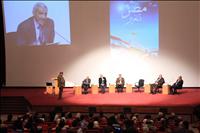Proceedings of the Second Day of "Egypt is Changing" Conference
Posted on

Within the framework of the second day of "Egypt is changing" conference held at the BA from 28 February to 1 March 2011, a session was held under the title "The Constitutional Principles of a Democratic State," with the participation of Egyptian intellectuals and thinkers. Moderated by Mr. Ayman Al-Sayyad, the event hosted Dr. Anissa Hassouna, Mr. Negad Borai and Dr. Mohammad Farhat.
Dr. Hassouna criticized the constitutional draft proposed by Egypt’s Constitutional Amendment Committee, which is headed by Legal Advisor, Tariq El-Bishri. One of her comments was that the Committee did not include a single woman despite the participation of Egyptian women in the 25th of January Revolution. She was also surprised by the condition stating that a presidential candidate should not be married to a non-Egyptian. She called for the election, rather than the appointment, of the vice-president, as well as the holding of a public referendum on the constitution at large rather than its detailed amendments. Moreover, she also recomended the amendment of some old articles of the Egyptian Constitution. Mr. Negad Borai emphasized the same demands.
Dr. Hassouna supported the public demands to postpone the presidential elections, and to form a provisional presidential council in the event that integrity was not realized in the upcoming parliamentary elections. She pointed out the importance of excluding all the officials charged with fraud in the previous election from the poliotical arena.
Mr. Borai stated that the former regime figures were not the real reason behind the persistent conflicts between the civil-society organizations and the regime; it was, however, the policies of the regime. Therefore, the entire community must be prepared to defend itself against the return of the same repression practiced by the former regime. Regarding drafting a new Egyptian Constitution, Borai refused to give this responsibility to the coming People's Assembly , since its members will choose a constituent assembly, which will be inclined to their political ideologies.
Dr. Farhat clarified that the history of the Egyptian Constitutions focused on the authoritarian figure of a ruler, rather than the contractual nature of the ruler and ruled relationship. Therefore, the new Constitution shall be based on a political culture and overseen by societal institutions because it is not just a list of constitutional provisions. He stated that many rulers had acted without commitment to the constitution, and he gave the example of Mubarak’s stepping down, without submitting his resignment to the People’s Assembly, by handing over power - illegally - to the Supreme Council of the Armed Forces, an action which completely disregards the Constitution. He urged the need for drafting a new constitution.
Dr. Farhat emphasized that the Constitutional Amendment Committee must represent the people, and he proposed some mechanisms for drafting the new constitutional principles, on top of which were: questioning the former ruling authority, ousting the government, establishing political pluralism and political participation, securing the right to equality before the law, and safeguarding public freedom, civil rights and a multi-party system.
At the closing of the session, the attendees unanimously criticized the proposed constitutional amendments for ignoring the Law of Parties despite the present importance of party formation in establishing the desired political mobility.
Read about the proceedings of the first day here.